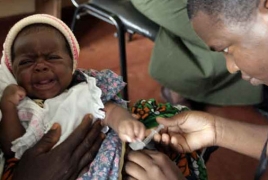Scientists following new clues in their quest to stop malaria February 7, 2018 - 14:40 AMT PanARMENIAN.Net - Science detectives are following new clues in their quest to stop a killer — malaria, Science News for Students says. The disease claimed the lives of roughly 429,000 people in 2015 alone, according to the World Health Organization. And kids face the biggest risk. More than seven in every 10 of malaria’s victims are children. The disease is caused by a parasite that spends part of its life cycle in mosquitoes and part in blood-making animals. Once it gets into people, it attacks liver and blood cells. Mild cases cause fever, headaches and chills. Severe cases leave the blood with too few healthy cells to carry oxygen. Sometimes, the disease also affects the lungs and brain. Some medicines can cure malaria. But those drugs don’t always work. So scientists are exploring new ways to thwart this killer. Last summer, they described two of them at a meeting here in Chicago, Ill. “Malaria doesn't just affect humans,” explains Holly Lutz. She works in Chicago at the Field Museum and the University of Chicago. Bats, other mammals, birds and lizards also can develop the disease. “In fact, nearly all terrestrial vertebrates can be infected with their own species of malaria,” she says. Lutz calls herself “both an evolutionary biologist and a microbial ecologist. But first and foremost, I am an explorer,” she says. By exploring animals and their parasites, Lutz hopes to learn more about how to thwart malaria in people. A microscopic parasite called Plasmodium (Plaz-MO-dee-um) is behind the illness. Mosquitoes pick up the microbe when they feed on infected blood. It grows in their gut. Then it gets into the insects’ saliva. When a mosquito takes its next bite, it can now share some of these parasites with a new host. In many cases, that host may be a human. There is some good news. Malaria killed only about half as many people in 2015 as it did 15 years earlier. Bed nets helped. People drape these mesh curtains, treated with mosquito-killing poison, over their beds at night. Medical care is better in some areas, too. Authorities said a total of 192 Azerbaijani troops were killed and 511 were wounded during Azerbaijan’s offensive. In 2023, the Azerbaijani government will increase the country’s defense budget by more than 1.1 billion manats ($650 million). The bill, published on Monday, is designed to "eliminate the shortcomings of an unreasonably broad interpretation of the key concept of "compatriot". The earthquake caused a temporary blackout, damaged many buildings and closed a number of rural roads. Partner news |